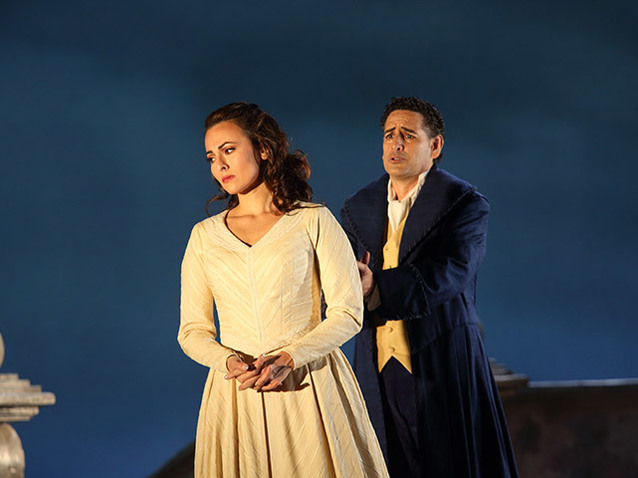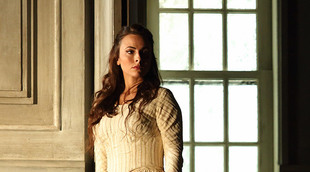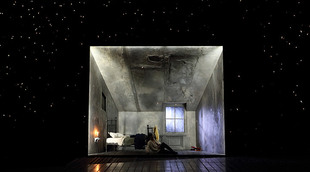 © (c) Catherine Ashemore
© (c) Catherine Ashemore
Jules Massenet’s Werther, with libretto by Édouard Blau, Paul Milliet and Georges Hartmann, was written between 1885 and 1887, although it did not premiere until 1892. Set in Wetzlar in Germany in the 1780s, and loosely based on Goethe’s epistolary novel The Sorrows of Young Werther, it concerns a melancholic poet who is besotted with Charlotte. Their feelings for each other begin to develop when her betrothed Albert is away, but he returns unexpectedly and Charlotte feels obliged to marry him as she promised her now dead mother she would do so. After the wedding has taken place, Albert grows to realise that Werther loves Charlotte, and not unkindly suggests that he pursues her younger sister Sophie, who clearly has feelings for him. Werther rejects the idea, and Charlotte begs him to leave although, not being able to face the thought of never seeing him again, she suggests he might return at Christmas.
After Werther departs, however, it is still not clear if he will ever come back, but he does so on Christmas Eve. After seeing Charlotte, and realising that she does reciprocate his love, he leaves once more and sends a message to Albert asking for pistols as he is going on a long journey. Albert sends these, but Charlotte fears the worst and chases after Werther, only to arrive at his apartment after he has already shot himself. She has a final heart to heart with him, but the damage has already been done and he dies while children outside are heard singing a Christmas carol.
Benoît Jacquot’s production was first seen at the Royal Opera House in 2004, and now enjoys its third revival with Andrew Sinclair at the helm. Several of Charles Edwards’ sets create diagonals across the stage, and are possessed of many telling details as they highlight the passing of the seasons. For example, in Act I the high wall of the Bailli’s garden reveals life and growth at one end and death and dereliction at the other. The huge gate in it, when open, creates a gap that suggests that the transition from one state to the other can be prevented. When it is closed, however, it implies that the slide is inevitable.
Act III’s set is decked out to look exactly like a Vilhelm Hammershøi painting. He is an artist that many designers look to when staging Ibsen, and it is not difficult to see why as his monochrome shades highlight feelings of unease and isolation. Here the similarities are made all the stronger by the curtain rising on Charlotte with her back to the audience assuming the pose of many a woman in his paintings, while items to be found in his pictures are incorporated into the drama. For example, a square piano lies along the back wall, which (nearly) ties in with Werther’s reference to the harpsichord that they used to sing to.
Edwards’ lighting is also intelligent with many scenes seeing the action illuminated predominantly from one angle. Act I’s moonlit encounter sees the figures lit diagonally from the back, while in Act III the light floods in from stage left creating huge shadows across the floor. Werther’s apartment is represented by a small box-like area that, surrounded by darkness, really draws us into the tragedy of the poet’s death, as half of the room is bathed in light and the other in darkness. The opera is set from one July to the following Christmas, and this is signified by autumn leaves lying all around in Act II, and pinprick lights signifying falling snow at the end.

Juan Diego Florez as Werther (c) ROH 2019 / Catherine Ashmore

Isabel Leonard as Charlotte (c) ROH 2019 / Catherine Ashmore
While the opera may possess a wondrous score, the tale of a woe stricken and doomed poet hardly generates action in abundance. As such, it is really down to the performers to hook us into the piece emotionally by seeing us engage with the characters at every turn. In this revival they do so for the majority of the evening, but perhaps not as consistently as would be ideal. Dramatically, Juan Diego Flórez in the title role takes a while to warm up because when initially things do not go his way, this manifests itself too much through anger alone. As a result, it sometimes feels as if he is simply being petulant, so that we do not feel the total despair that he is experiencing inside that would really help us to engage with his emotions. Things do change, however, during his Act II encounters with Albert and Sophie, when his ‘freezing’ contrasts with their relatively kind words or youthful vivaciousness, making us realise just how empty he really feels inside.
Flórez’s forte is the ethereal lightness in his tenor, and here one senses that the part requires just a little more heft. He does project the lines, but there seems to be a tendency to concentrate on each individually so that there does not seem to be so strong a sense of flow through them. Nevertheless, with this type of focus does come a sense of passion, and he still undoubtedly puts in a strong performance with ‘Pourquoi me réveiller?’, in particular, making the grade.
On her Royal Opera debut, Isabel Leonard is an outstanding Charlotte, with a sensitive demeanour, and powerful mezzo-soprano that also demonstrates excellent shape and phrasing as it glides through the lines. She is clearly capable of very rich vibrato, but does adjust the amount that she applies to suit the situation. Jacques Imbrailo, with his excellent baritone, makes much of the role of Albert. Often the character can simply seem dependable and boring compared with Werther, but here he really seems like a match for the poet. In fact, given that he has Charlotte and presents such a likeable persona we can really feel that he possesses everything that Werther craves.
Heather Engebretson, who also played Sophie in the last revival here in 2016, is again superb, bringing an appropriate volume to her singing, while still making her sound feel sweet and light at every turn. She similarly makes us appreciate how the opera is also about Sophie’s tragedy for she too loses the man she loves. Alastair Miles is a strong Bailli, who as he teaches the children a Christmas carol at the start helps to create a sense of domestic bliss before the troubles begin, while Michael Mofidian and Vincent Ordonneau as friends of the Bailli, Johann and Schmidt, are cast from strength. In the pit, Edward Gardner’s conducting is extremely engaging as it always achieves the right balance between lush, sensitive and sometimes foreboding playing.
By Sam Smith
Werther | 17 September – 5 October 2019 | Royal Opera House, Covent Garden
the 23 of September, 2019 | Print

Comments